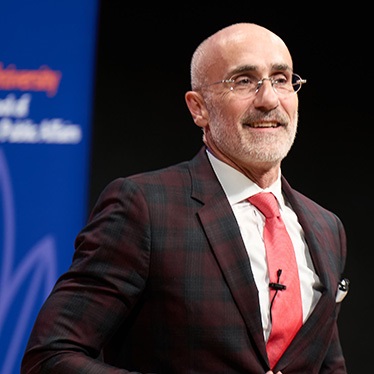New Knowledge - Tapping Into Maxwell’s Scholarly Distinction
February 24, 2023
Tapping into Maxwell’s scholarly distinction, undergraduates now have almost limitless opportunities for research and deeper study.
Natalia Rice, a senior sociology and English and textual studies major from Buffalo, New York, has long been committed to understanding the roots of social injustices; in high school she completed a mini-thesis on intersectional identity politics. Coming to Maxwell, she saw sociology as a discipline where she could dig deeper into these issues both inside and outside the classroom.
Rice wasted no time in getting involved in independent research on campus. As a freshman, she was selected as a Young Research Fellow through Syracuse University’s Center for Fellowship and Scholarship Advising and embarked on a project about “casual segregation” among young millennials. Now, as a senior—and still a Young Research Fellow—she’s working on a sociology distinction and honors thesis, with sociology professor Gretchen Purser as her advisor, on the experiences of students of color at SU and their modes of belonging. For this project Rice conducts semi-structured interviews with undergraduates, and she is often struck by how this project resonates with her coursework.
“I find myself having moments of inspiration when in class or while completing assignments—such as learning a new concept that sheds light on a code that keeps popping up in my interview transcripts,” she says. “While the curriculum had always carried meaning for me, simultaneously conducting this research makes me absorb it in a new way.”
Hands-on research is an integral part of the undergraduate experience for many Maxwell students—whether through courses, a thesis or capstone project, an internship, or one of Maxwell’s 10 interdisciplinary research centers.
“They’re really learning what goes on when graduate students and faculty do research.”
“We believe the social sciences give students the skills that will help them in any job they want to do,” says Carol Faulkner, associate dean for academic affairs. “One of those essential skills is research methods. The more we can get students involved in research, whether that’s abstract scholarly research or applied projects, they are gaining skills that will translate to other arenas of their life.”
For a number of undergraduates, research is built right into their major. History and International Relations both require courses on research methods and a substantial research project as part of completing a BA; and all Maxwell majors offer top students the option of writing a distinction thesis based on a one- or two-semester research project. In Citizenship and Civic Engagement, students write research-based Action Plans. All Syracuse University students in the Renée Crown University Honors Program also write theses.

The range of topics is impressive. Xinzhi Lin, a history and international relations major, is working with History department chair Norman Kutcher on a distinction thesis about the history of China’s Song Dynasty, for which he’s doing research in his ancestral home of Kaifeng. In addition, for his IR capstone, he’s studying Chinese diplomacy.
Deborah Orieta, who’s majoring in geography and food studies, is researching food sovereignty in Puerto Rico for her distinction thesis, advised by Geography chair Tom Perreault. “I did field visits and interviews throughout summer 2019, talking to farmers, activists, and educators involved in alternative agriculture on the island,” she says. “My interest is in seeing how this movement is helping build resilience after Hurricane María in 2017, and how those efforts also respond to the escalating threat of climate change.”
Amanda Jacobs—a triple major in geography, biology, and environment, sustainability, and policy—is conducting independent research on environmental imagery in the anti-plastics movement. The project, she says, discusses “why and how certain imagery is effective in conveying the problems associated with plastic pollution and garnering public support against plastics.”
Each spring an event called the Maxwell Celebration of Undergraduate Scholarship, established in 2013, spotlights the fruits of students’ research for distinction or honors theses. Selected students present their work in a poster session, and awards endowed by Maxwell Advisory Board member Ben Baldanza ’84 BA (Econ/PSt) and his wife, Marcia (a graduate of SU’s School of Education), are given for the best papers and posters. Last spring, topics of award-winning projects included ratification of the U.S. Constitution, by Joseph Pucciarelli ’19 BA (Hist); barriers to Palestinian statehood, by Dina Eldawy ’19 BA (CCE/IR); and the impact of the Dodd-Frank Act, by Cameron Taylor ’19 BS (Econ).

Outside of coursework and theses, undergraduates can get involved with the work of Maxwell’s interdisciplinary research centers and institutes, either for academic credit or as paid opportunities. An International Relations program, known as URAP (Undergraduate Research Assistant Program), places students with research projects in the Moynihan Institute of Global Affairs and occasionally in other units (recently Sociology, for example). The undergraduates “are doing real work and making important contributions to those research efforts, so it’s not a make-work job and it’s not just for show,” says IR department chair Matthew Cleary. “They’re really learning what goes on when graduate students and faculty do research.”
IR and political science major Crystal Rabizadeh recently became involved with a research project that analyzes global black spots—areas outside of effective governmental control—to better understand the transnational security challenges they present.
Other Maxwell centers that are engaging undergraduates in their research include the Lerner Center for Public Health Promotion and the Center for Policy Research’s X Lab, which evaluates policy results for public sector and nonprofit partners. Leonard Lopoo, director of CPR and the X Lab, says that undergraduates “conduct literature reviews, monitor data collection efforts, and clean data. We also frequently bring our undergraduate research assistants to meetings with our clients so they can see the issues that government officials are worried about and how we collaborate to create solutions.”
Research support for all SU students received a huge boost in 2018 with the creation of the SOURCE—the Syracuse Office of Undergraduate Research and Creative Engagement. Funded by a $1-million annual commitment from the University, this SU initiative provides grants of up to $5,000 for student research projects, guided by faculty mentors. This fall, six Maxwell students received SOURCE grants, on topics that range from Spanish language dialects spoken in Syracuse to online-news depictions of abortion.
“We know that the ability for students to work independently on their own projects is transformative,” says geography professor Jamie Winders. “The SOURCE has just upped the ante in terms of opportunities for our undergraduates to have firsthand research experience.”
By Jeffrey Pepper Rodgers
This article appeared in the Fall 2019 print edition of Maxwell Perspective © Maxwell School of Syracuse University. To request a copy, email maxwellperspective@syr.edu.
Related News
School News

Nov 19, 2024
School News

Nov 14, 2024
School News

Nov 6, 2024